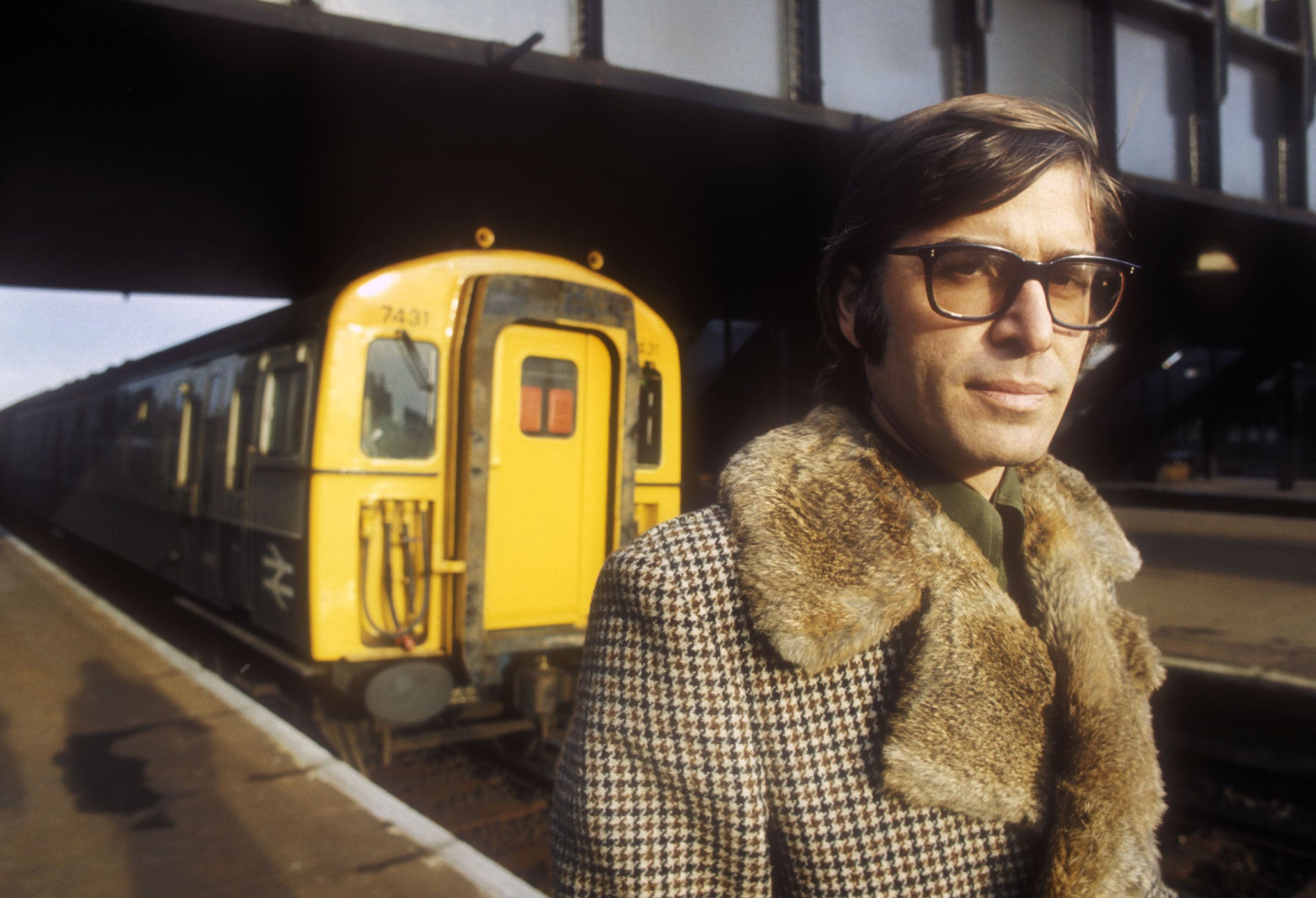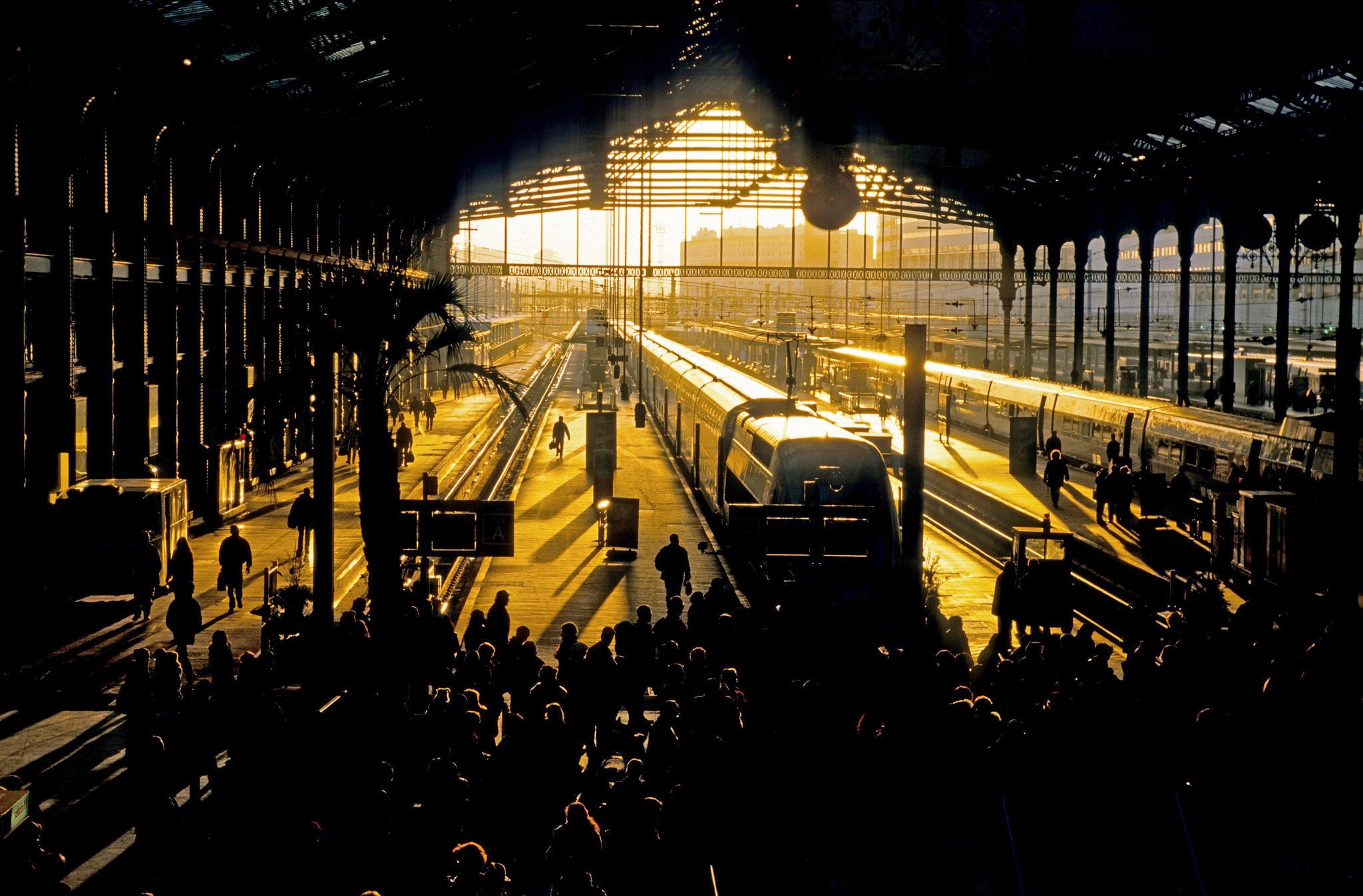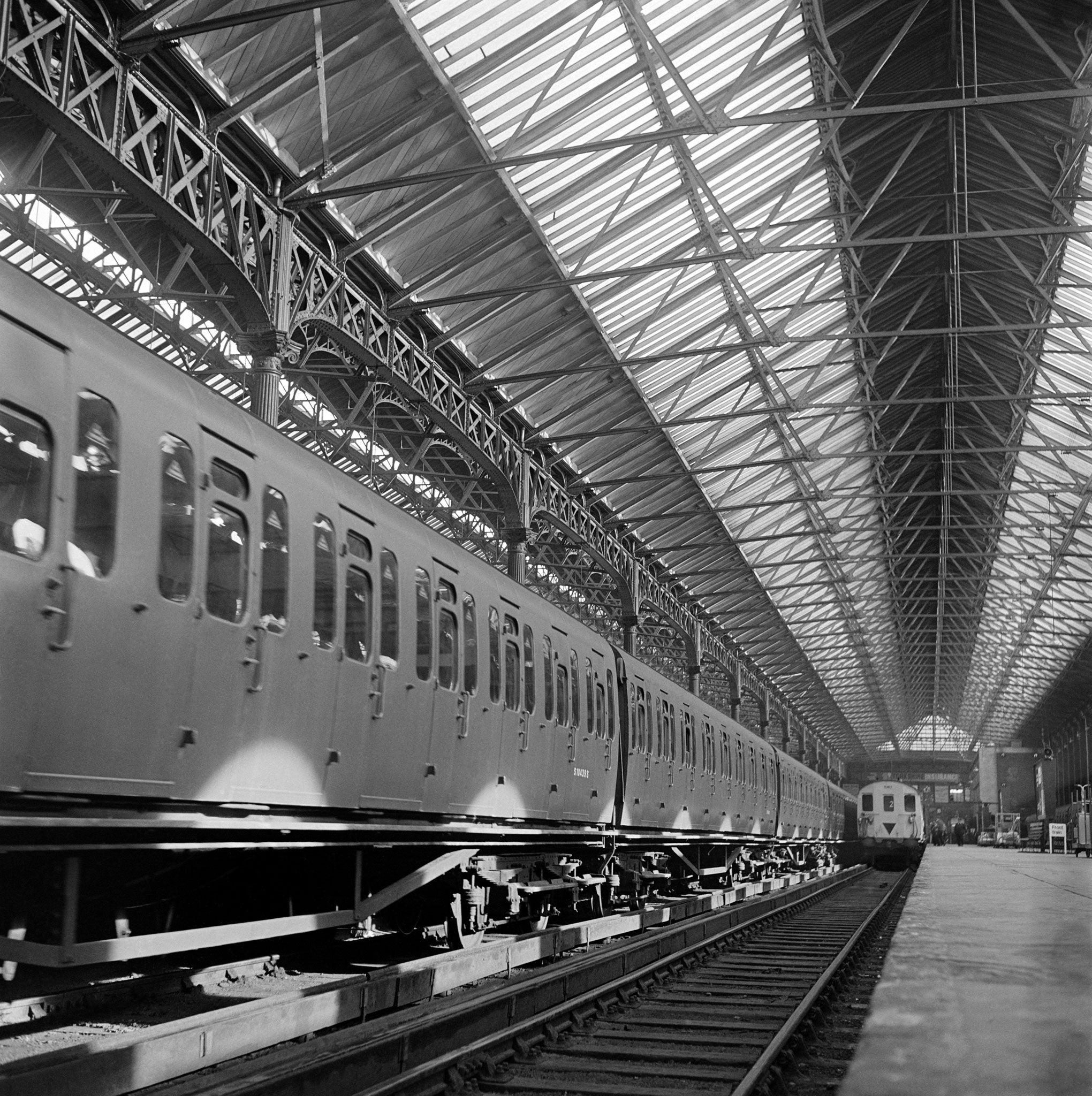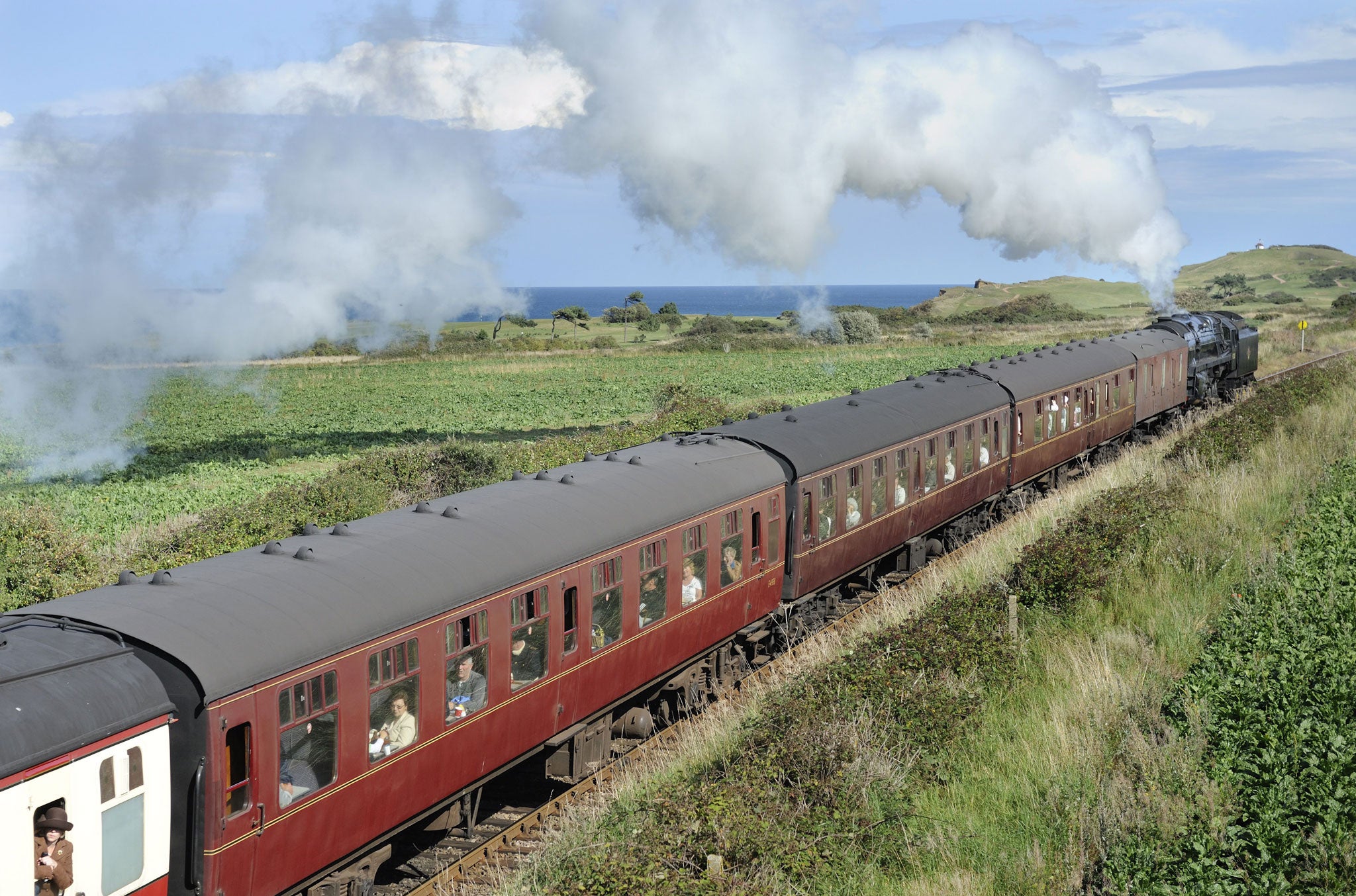Travel special 2014: Novelist Paul Theroux discusses the joys of travelling by train
'The Great Railway Bazaar', the first of Paul Theroux's classic travelogues, published in 1975, is the essential book about getting on a train and seeing where you end up. Here we reproduce, in full, its first chapter. In it, the novelist, then in his early thirties, escapes from London and begins a journey that would take in Istanbul, Iran, India, Japan and all in-between. Later, Theroux answers our questions on modern train travel...

Your support helps us to tell the story
From reproductive rights to climate change to Big Tech, The Independent is on the ground when the story is developing. Whether it's investigating the financials of Elon Musk's pro-Trump PAC or producing our latest documentary, 'The A Word', which shines a light on the American women fighting for reproductive rights, we know how important it is to parse out the facts from the messaging.
At such a critical moment in US history, we need reporters on the ground. Your donation allows us to keep sending journalists to speak to both sides of the story.
The Independent is trusted by Americans across the entire political spectrum. And unlike many other quality news outlets, we choose not to lock Americans out of our reporting and analysis with paywalls. We believe quality journalism should be available to everyone, paid for by those who can afford it.
Your support makes all the difference.Escape route: The 15.30 – London to Paris
Ever since childhood, when I lived within earshot of the Boston and Maine, I have seldom heard a train go by and not wished I was on it. Those whistles sing bewitchment: railways are irresistible bazaars, snaking along perfectly level no matter what the landscape, improving your mood with speed, and never upsetting your drink. The train can reassure you in awful places – a far cry from the anxious sweats of doom aeroplanes inspire, or the nauseating gas-sickness of the long-distance bus, or the paralysis that afflicts the car passenger. If a train is large and comfortable, you don't even need a destination; a corner seat is enough, and you can be one of those travellers who stay in motion, straddling the tracks, and never arrive or feel they ought to – like that lucky man who lives on Italian Railways because he is retired and has a free pass. Better to go first class than to arrive, or, as the English novelist Michael Frayn once rephrased McLuhan: "the journey is the goal". But I had chosen Asia, and when I remembered it was half a world away I was only glad.
Then Asia was out the window, and I was carried through it on these eastbound expresses marvelling as much at the bazaar within the train as the ones we whistled past. Anything is possible on a train: a great meal, a binge, a visit from card players, an intrigue, a good night's sleep, and strangers' monologues framed like Russian short stories. It was my intention to board every train that chugged into view from Victoria Station in London to Tokyo Central; to take the branch line to Simla, the spur through the Khyber Pass, and the chord line that links Indian Railways with those in Ceylon; the Mandalay Express, the Malaysian Golden Arrow, the locals in Vietnam, and the trains with bewitching names, the Orient Express, the North Star, the Trans-Siberian.
I sought trains; I found passengers.
The first was Duffill. I remember him because his name later became a verb – Molesworth's, then mine. He was just ahead of me in the line at Platform 7 at Victoria, 'Continental Departures'. He was old and his clothes were far too big for him, so he might have left in a hurry and grabbed the wrong clothes, or perhaps he'd just come out of the hospital. He walked treading his trouser cuffs to rags and carried many oddly-shaped parcels wrapped in string and brown paper – more the luggage of an incautiously busy bomber than of an intrepid traveller. The tags were fluttering in the draught from the track, and each gave his name as R Duffill and his address as Splendid Palas Hotel, Istanbul. We would be travelling together. A satirical widow in a severe veil might have been more welcome, and if her satchel was full of gin and an inheritance, so much the better. But there was no widow; there were hikers, returning Continentals with Harrods shopping bags, salesmen, French girls with sour friends, and grey-haired English couples who appeared to be embarking, with armloads of novels, on expensive literary adulteries. None would get farther than Ljubljana. Duffill was for Istanbul – I wondered what his excuse was. I was doing a bunk, myself. I hadn't nailed my colours to the mast; I had no job – no one would notice me falling silent, kissing my wife, and boarding the 15.30 alone.
The train was rumbling through Clapham. I decided that travel was flight and pursuit in equal parts, but by the time we had left the brick terraces and coal yards and the narrow back gardens of the south London suburbs and were passing Dulwich College's playing fields – children lazily exercising in neckties – I was tuned to the motion of the train and had forgotten the newspaper billboards I had been reading all morning: BABY KRISTEN: WOMAN TO BE CHARGED and PLAN TO FREE STAB GIRL AGED NINE – none lettered NOVELIST VANISHES and just as well. Then, past a row of semi-detached houses, we entered a tunnel, and after travelling a minute in complete darkness we were shot wonderfully into a new setting, open meadows, cows cropping grass, farmers haying in blue jackets. We had surfaced from London, a grey sodden city that lay underground. At Sevenoaks there was another tunnel, another glimpse of the pastoral, fields of pawing horses, some kneeling sheep, crows on an oasthouse, and a swift sight of a settlement of prefab houses out one window. Out the other window, a Jacobean farmhouse and more cows. That is England: the suburbs overlap the farms. At several level crossings the country lanes were choked with cars, backed up for a hundred yards. The train passengers were gloating vindictively at the traffic and seemed to be murmuring, "Stop, you bitches!"

The sky was old. Schoolboys in dark blue blazers, carrying cricket bats and school bags, their socks falling down, were smirking on the platform at Tonbridge. We raced by them, taking their smirks away. We didn't stop, not even at the larger stations. These I contemplated from the dining car over a sloshing carton of tea, while Mr Duffill, similarly hunched, kept an eye on his parcels and stirred his tea with a doctor's tongue depressor. Past the hopfields that give Kent a Mediterranean tangle in September; past a gypsy camp, 14 battered caravans, each one with its own indestructible pile of rubbish just outside the front door; past a farm and, 40 feet away, the perimeter of a housing estate with lots of interesting clothes on the line: plus fours, long johns, snapping black brassieres, the pennants of bonnets and socks, all forming an elaborate message, like signal flags on the distressed convoy of those houses.
The fact that we didn't stop gave this English train an air of hurrying purpose.We sped to the coast for the Channel crossing. But it was a false drama. Duffill, at his pitching table, ordered a second cup of tea. The black train yards of Ashford loomed and tumbled past, and we were crossing the hummocky grass of Romney Marsh, headed towards Folkestone. By then I had left England behind. So had the other passengers. I returned to my compartment to hear Italians raising their voices, perhaps deriving courage from the assurance that we were at the edge of England. Some Nigerians, who until that moment had been only a quartet of bobbing headgear – two Homburgs, a turban, and a beehive wig – became vocal in Yoruba, seeming to spell out each word they used, smacking their lips when they completed a syllable. Each passenger migrated to his own language, leaving the British muttering and averting their eyes.
"Oh, look," said a woman, unfolding a handkerchief on her lap.
"It's so neat and orderly," said the man at the window.
"Fresh flowers." The woman gently bandaged her nose with the handkerchief and snorted on one side, then the other.
The man said, "War Graves Commission takes care of them".
"They do a lovely job."
A small figure carrying paper parcels bound with string walked down the passage, his elbows thumping the corridor window. Duffill.
The Nigerian lady leaned over and read the station sign: "Frockystoon". Her mispronunciation was like sarcasm and she looked as unimpressed as Trollope's Lady Glencora ("There was nothing she wanted so much as to see Folkestone").
The wind, rising from the harbour, which was lead grey and pimpled with drizzle, blew into my eyes. I was > squinting with the cold I had caught when the first September chill hit London and roused in me visions of palm trees and the rosy heat of Ceylon. That cold made leaving all the easier; leaving was a cure: "Have you tried aspirin?" "No, I think I'll go to India." I carried my bags into the ferry and made for the bar. Two elderly men stood there. One was tapping a florin on the counter, trying to get the barman's attention.
"Reggie's got awfully small," said the first man.
"Do you think so?" said the second.
"I'm afraid I do. Awfully small. His clothes don't fit him."
"He was never a big man."
"I know that. But have you seen him?"
"No. Godfrey said he'd been sick."
"I'd say very sick."
"Getting old, poor chap."
"And awfully small."
Duffill came over. He might have been the person under discussion. But he wasn't: the elderly gentlemen ignored him.
Duffill had that uneasy look of a man who has left his parcels elsewhere, which is also the look of a man who thinks he's being followed. His oversized clothes made him seem frail. A mouse-grey gabardine coat slumped in folds from his shoulders, the cuffs so long, they reached to his fingertips and answered the length of his trampled trousers. He smelt of bread crusts. He still wore his tweed cap, and he too was fighting a cold. His shoes were interesting, the all-purpose brogans country people wear. Although I could not place his accent – he was asking the barman for cider – there was something else of the provinces about him, a stubborn frugality in his serviceable clothes, which is shabbiness in a Londoner's. He could tell you where he bought that cap and coat, and for how much, and how long those shoes had lasted. A few minutes later I passed by him in a corner of the lounge and saw that he had opened one of his parcels. A knife, a length of French bread, a tube of mustard, and discs of bright-red salami were spread before him. Lost in thought, he slowly chewed his sandwich.

The station at Calais was dark, but the Paris Express was floodlit. I was comforted. Lady Glencora says to her friend, "We can get to the Kurds, Alice, without getting into a packet again. That, to my way of thinking, is the great comfort of the Continent." Well, then, to Paris, and the Orient Express, and the Kurds. I boarded and, finding my compartment oppressively full, went to the dining car for a drink. A waiter showed me to a table where a man and woman were tearing their bread rolls apart but not eating them. I tried to order wine. The waiters, hurrying back and forth with trays, ignored my pleading face. The train started up; I looked out the window, and when I turned back to the table I saw that I had been served with a piece of burnt fish. The roll-shredding couple explained that I'd have to ask the wine waiter. I looked for him, was served the second course, then saw him and ordered.
"Angus was saying in The Times that he did research," the man said. "It just doesn't make sense."
"I suppose Angus has to do research," said the woman.
"Angus Wilson?" I said.
The man and woman looked at me. The woman was smiling, but the man gave me a rather unfriendly stare. He said, "Graham Greene wouldn't have to do research".
"Why not?" I asked.
The man sighed. He said, "He'd know it already."
"I wish I could agree with you," I said. "But I read As If By Magic and I say to myself, 'Now there's a real agronomist!'.
"Then I read The Honorary Consul and the 30-year-old doctor sounds an awful lot like a 70-year-old novelist. Mind you, I think it's a good novel. I think you should read it. Wine?"
"No, thank you," said the woman.
"Graham sent me a copy," said the man. He spoke to the woman. "Affectionately, Graham. That's what he wrote. It's in my bag."
"He's a lovely man," said the woman. "I always like seeing Graham."
There was a long silence. The dining car rocked the cruets and sauce bottles, the dessert was served with coffee. I had finished my half-bottle of wine and was anxious for another, but the waiters were again busy, reeling past the tables with trays, collecting dirty plates.
"I love trains," said the woman. "Did you know the next carriage on is going to be attached to the Orient Express?"
"Yes," I said. "As a matter of fact..."
"Ridiculous," said the man, addressing the small pencilled square of paper the waiter had given him. He loaded the saucer with money and led the woman away without another glance at me.
My own meal came to 45 francs, which I estimated to be about $10. I was horrified, but I had my small revenge. Back in my compartment I realised I had left my newspaper on the table in the dining car. I went back for it, but just as I put my hand on it, the waiter said, "Qu'est-ce que vous faites?"
"This is my paper," I snapped.
"C'est votre place, cela?"
"Of course."
"Eh bien alors, qu'est-ce que vous avez mangé?" He seemed to be enjoying the subtlety of his cross-examination.
I said, "Burnt fish. A tiny portion of roast beef. Courgettes, burnt and soggy, cold potatoes, stale bread, and for this I was charged 45, I repeat, 45..."
He let me have my paper.
At the Gare du Nord my car was shunted on to a different engine. Duffill and I watched this being done from the platform and then we boarded. It took him a long time to heave himself up, and he panted with effort on the landing. He was still standing there, gasping, as we pulled out of the station for our 20-minute trip to the Gare de Lyons to meet the rest of the Direct-Orient Express. It was after 11, and most of the apartment blocks were in darkness. But in one bright window there was a dinner party ending, like a painting of a city interior, hung and illuminated in the shadowy gallery of rooftops and balconies. The train passed and printed the window on my eye: two men and two women around a table on which there were three wine bottles, the remains of a large meal, coffee cups, a raided bowl of fruit. All the props, and the men in shirt sleeves, spoke of amiable intimacy, the sad comedy of a reunion of friends. Jean and Marie had been away. Jean was smiling, preparing to clown, and had pulled one of those confounded French faces. He waved his hand back and forth and said, "She got up on the table like a mad woman and began shaking it at me like this. Incredible! I said to Marie, 'The Picards will never believe this!' This is the truth. And then she..."
The train made its slow circuit of Paris, weaving among the dark buildings and shrieking frseeeeeeeefronnnng into the ears of sleeping women. The Gare de Lyons was alive, with that midnight glamour of bright lights and smoking engines, and across the gleaming tracks the ribbed canvas over one particular train turned it into a caterpillar about to set off and chew a path through France. On the platform arriving passengers were yawning, shambling with fatigue. The porters leaned on luggage carriers and watched people struggling with suitcases. Our car met, and coupled with, the rest of the Direct-Orient Express; that bump slid the compartment doors open and threw me forward into the lap of the lady opposite, surprising her from sleep.
From 'The Great Railway Bazaar (Penguin, £10.99)
Q&A Paul Theroux, January 2014
The Independent: Why do trains have such romantic allure when it comes to travel?
Theroux: It's not the romance of the train but the pleasurable ordinariness and freedom – no interrogation beforehand, no metal detector, nothing to alarm you. You don't leave the ground. And then the great weight of the thing howling on metal rails as you sit watching what Ford Madox Ford called "little bits of uncompleted life" out the window. There is an account of a train journey in, of all places, TS Eliot's Four Quartets – in part three of "The Dry Salvages" – where he talks about the passengers settling in, beginning to read magazines and "Their faces relax from grief into relief". He also says something about the train passenger arriving at the destination a different person. An airline flight is never a notable experience; a train journey often is. I try, in travel, not to be a romantic voyeur, though I often fail.
Is it about the journey or the destinations?
I think it's both, though when I have been on a great railway journey I seldom wanted it to end. The Trans-Siberian Express is like a cruise across an oceanic landscape. I've done it three times. A train from Elmer's End to Charing Cross can be more uncomfortable than, say, The Rajdhani Express from Delhi to Mumbai. And think of the practical aspects – you can eat and sleep on a train, you can walk around and meet people, you can hop off if you like. And unlike travel on a bus, a car, or a plane, you can write quite comfortably. I have written stories, essays, even whole books on trains, scribble-scribble.

Why, if it's all so romantic, do train-spotters exist?
Some people are attracted to the look of trains, to steam trains, to their scheduling and their engines, their wheel configurations. I am interested purely in the interior, the seat, the berth, and on a German train I took a few years ago, the shower stall that was part of my first-class compartment.
Is there a rail journey you wish you'd taken but haven't?
I wanted to travel from Quito to Guayaquil on that precipitous line when I wrote The Old Patagonian Express. I procrastinated and ultimately the line fell apart – the result of a landslide – and was not rebuilt. In contrast to that, when I was in Vietnam in 1973 I longed to take the train from Saigon to Hanoi, but the war prevented me from doing so. I took this trip, joyously, for my book Ghost Train to the Eastern Star. I have the idea that Noël Coward wrote "Mad Dogs and Englishmen" on that train.
What's the shortest, best train journey in the world?
Used to be The Brighton Belle. Any train that traverses the English coast – Devon, for example: that sight of the sea next to the line, marine sunlight flashing on the tracks. The overnighter from London to Inverness, the overnighter from Bangkok north to the Mekong River, any train that takes you from the familiar to the strange, without much effort, but with a good meal.
Is the rise in luxury train travel – the Maharajas Express, Orient Express etc – a good thing, or does it give a false impression of train travel?
They are all wonderful, though some are more expensive than others, and that's a catch. I have taken many of the luxury trains and have nothing but praise. But my preference is to find a train that is little known, my own discovery, and to ride it alone, anonymously across a landscape new to me. The small rattly train from Sapporo, snowy in wintertime Hokkaido in northern Japan, to the northernmost station, in even snowier Wakkanai – lovely, a whole day of it.
How often have you been on a train in the past year?
A few months ago from Belfast to Dublin and then Cork – people told me the plane is quicker. But planes are nasty, and I am not in a hurry, and I loved that trip. Lots of trips from Boston to New York on the Acela Express. One in Spain, a few in India. It is often a consolation to me, when I am in a foreign city, to visit the main railway station and figure out how far I can go from there. I was in the city of Porto, in Portugal a few years ago, in the station, and estimated that I could, with a little time but not much trouble, get from there to southern Vietnam.
Join our commenting forum
Join thought-provoking conversations, follow other Independent readers and see their replies
Comments